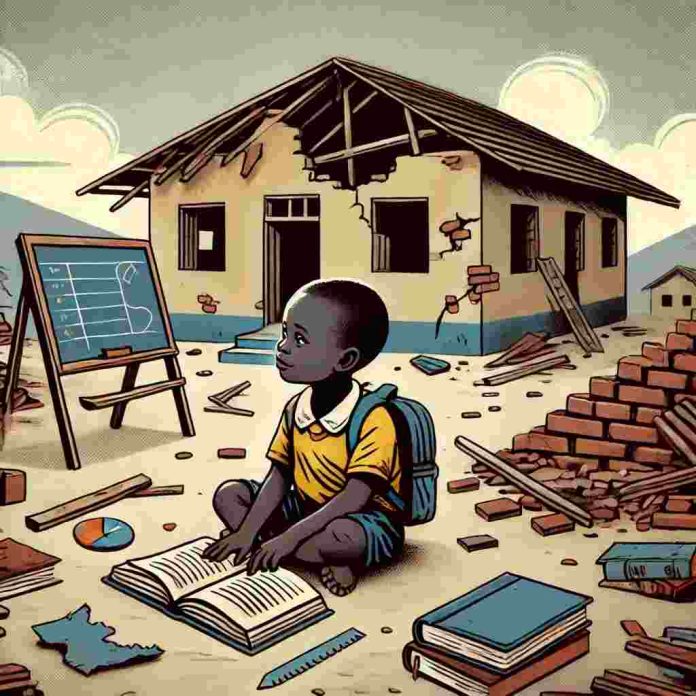The recent rise in violence and displacement in the eastern Democratic Republic of Congo (DRC) has put children’s education in serious jeopardy. UNICEF has called for emergency measures to save children’s school year in view of this situation. In this article, we will discuss in detail the causes of this Education crisis in eastern Congo, UNICEF’s efforts, and the current situation of children.
Rising violence and displacement in eastern Congo
Violence has increased rapidly in eastern Congo in recent months. Millions of people have been forced to flee their homes due to the conflict. Currently, more than 6.5 million people are displaced in the region, including 2.6 million children. This situation is not only a crisis for humanity, but it is also having a serious impact on the education and development of children.
Pressure on the education system due to education crisis in eastern Congo
The education system of eastern Congo was already under pressure, but recent conflicts have weakened it further.
Closure of schools: Since the beginning of this year, more than 2,500 schools and learning spaces, especially in North Kivu and South Kivu, have closed. These include schools located in displacement camps.
Children deprived of education: Due to the closure of schools, 795,000 children are now deprived of education, up from 465,000 in December 2024. If the Ituri province is also included, more than 1.6 million children in eastern Congo are no longer able to attend school.
UNICEF’s response on Education crisis in eastern Congo
UNICEF has taken this crisis seriously and described the situation of children as “desperate”.
The importance of education: UNICEF Representative, Jean-François Basse, said, “Education and the support systems it provides are needed so that children can experience normality and recover after this conflict.”
Reopening of schools: Schools reopened in Gonga on 9 February, but with very few students in attendance. Parents have expressed concern about the security situation.
Role of schools
In any time of crisis, schools play a vital role in maintaining stability and providing safe spaces for children.
Place of safety: Schools provide a safe space for children to protect them from potential recruitment by armed groups and sexual violence.
Psychological support: Schools can also provide psychological support to children who have experienced trauma during the conflict.
UNICEF efforts
UNICEF is taking a number of measures to ensure the continuity of education in eastern Congo.
Temporary learning spaces: UNICEF, together with its partners, is setting up temporary learning spaces and distributing school materials as well as hygiene and health kits.
Radio-based education: UNICEF plans to use radio-based education and accelerated learning programmes to reach remote and marginalised children.
Mine risk education: Due to mine and explosive residues around Gonga, UNICEF will also focus on mine risk education.
UNICEF’s appeal
UNICEF has requested US$52 million to meet the education needs of 480,000 children.
Appeal to parties to the conflict: UNICEF has appealed to all parties to the conflict to respect education facilities and other civilian assets and to immediately end military use of any education facility.
Long-term impact of the education crisis
If this crisis is not resolved, it can have long-term impacts on children’s future.
Right to education: Children being deprived of education can limit their development and future opportunities.
Social stability: Lack of education can increase instability in society, increasing the likelihood of violence and conflict.
UNICEF’s efforts needed
The support of the international community is necessary for UNICEF’s efforts to be successful.
Financial support: It is important to provide UNICEF with the necessary financial support so that they can effectively implement their programs.
Social awareness: It is also important to raise awareness about this crisis and motivate people to act in this direction.
Conclusion
The education crisis in Eastern Congo is a serious humanitarian crisis, in which the future of children is at stake. This crisis can only be resolved through the efforts of UNICEF and the support of the international community.
Urgent action needed: Urgent action is needed to ensure children get their right to education.
Safe and sustainable education: We must ensure that all children can get safe and sustainable education, so that they can shape their future.
Thus, everyone needs to work together to solve the education crisis in Eastern Congo. By supporting UNICEF’s appeal and their efforts, we can take important steps in this direction.
Also Read: How AI and ML in Education Are Transforming Learning for the Future

